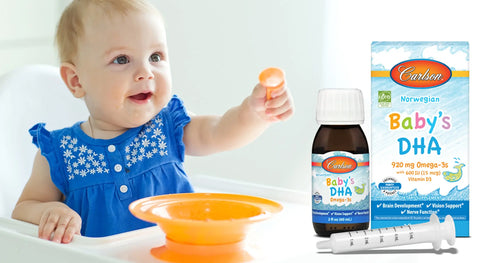
Docosahexaenoic acid (DHA) represents a fundamental component in the maintenance of optimal health across various life stages. This essential omega-3 fatty acid plays an important role in healthy brain development, visual acuity, and the integrity of cellular membranes throughout the human lifespan. The significance of DHA cannot be overstated, as it's crucial for neurological development in infancy and continues to support cognitive function, mental well-being, and cardiovascular health into adulthood.
What is DHA?
DHA is a long-chain omega-3 fatty acid that constitutes a major structural component of the brain, retina, nerve, and cell membranes, signifying its indispensable role in neural, cognitive, and visual development and maintenance. It facilitates the fluidity of cell membranes and supports cell signaling in the neurons across the synapses, enhancing signal transmission between nerve cells. Scientific research underscores DHA's contribution to brain health, emphasizing its impact on neurogenesis, synaptic plasticity, and neuroprotection which are vital processes for learning and memory.
Am I Getting Enough Omega-3s?
Unfortunately, there are many places around the world that have been found to consume exceptionally low amounts of omega-3s, and the USA is one of them. The American Heart Association (AHA) suggests we eat at least two 3.5-ounce servings of fatty fish such as salmon, mackerel, and sardines per week; however, for individuals unable to meet their requirements through diet alone, a high-quality supplement is recommended. There are marine sources or algae-based supplements for those adhering to vegetarian or vegan diets. Optimal dosages of omega-3 can differ substantially based on individual factors including age, health status, and lifestyle habits.
The Importance of DHA During Infancy
During infancy (0-12 months), DHA is crucial for brain, eye, and nervous system development in utero and after birth. The World Health Organization recommends a daily intake of 0.5% of total energy from DHA for infants aged 6-12 months or approximately 100-500 mg daily. Breast milk naturally contains DHA; however, formula-fed infants may require DHA fortified products to meet their needs. When taken after pregnancy, DHA can help enhance the quality of breast milk. Omega-3s are especially needed in the last trimester and 12 weeks after birth because this is when DHA demands are high for proper brain development, and it is particularly important during your child’s first two years of life as their brains nearly double in size.
DHA Needs During Childhood
Children (1-10 years old) continue to require DHA for ongoing brain development and cognitive function. An intake of at least 100-500 mg of DHA per day is advised for children in this age group, as suggested by leading health organizations and as seen in various studies. Adolescents (11-18 years old) need sufficient DHA to support continued brain growth and emotional regulation. Recommendations suggest a daily intake of 200-600 mg to support cognitive processes including learning and memory and to maintain optimal health outcomes during these formative years.
The Recommended Intake of DHA for Adults
In adulthood(19+), the emphasis on DHA intake shifts toward maintaining healthy cognitive function, supporting mental health, and promoting healthy cardiovascular function. DHA also supports a healthy mood and a sense of calm when taking 2,000 mg of EPA and DHA, but less than 60% of EPA. To maintain healthy cognitive function, it's recommended we receive at least 1,000 mg of DHA and some EPA.
A woman’s demand for DHA increases dramatically during pregnancy and 9-12 months after delivery. Recent studies look at a mother's DHA levels in regards to preterm birth. Experts recommend a minimum intake of 500 mg of DHA per day during pregnancy and while breastfeeding.
For elderly individuals, adequate DHA intake becomes increasingly pertinent in supporting cognitive health and fostering whole body health and graceful aging.
DHA is a cornerstone nutrient that's very important to our health at all stages of life.






